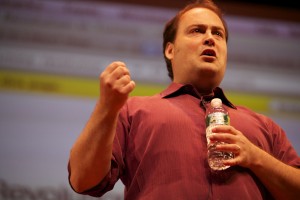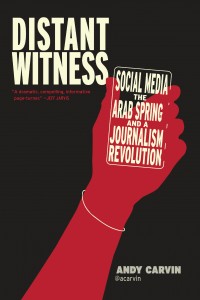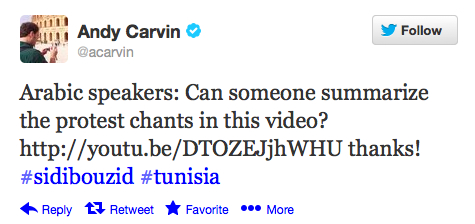Distant witness: NPR’s Andy Carvin tweeting news and revolutions
 Andy Carvin is a senior strategist at National Public Radio (NPR) and leads their social media strategy. He describes himself as a “real-time informational DJ and occasional journalist, but not a social media guru”, although many would regard him as just that.
Andy Carvin is a senior strategist at National Public Radio (NPR) and leads their social media strategy. He describes himself as a “real-time informational DJ and occasional journalist, but not a social media guru”, although many would regard him as just that.
Andy Carvin’s Twitter feed @acarvin is regarded as essential for following breaking news events, particularly in the Middle East. Carvin has some 88,000 followers on Twitter. But it’s his method of aggregating, filtering and verifying news sources through social media that has attracted global attention.
 Carvin’s new book Distant Witness (CUNY Journalism Press) explores how social media and the Arab Spring have caused a revolution in journalism. It’s essential reading for journalists. Not only does Carvin tell a compelling story, interwoven with gripping Tweets, he offers insight into citizen journalism and how news organisations can use social media effectively. As Carvin puts it: “storytelling has entered new territory”.
Carvin’s new book Distant Witness (CUNY Journalism Press) explores how social media and the Arab Spring have caused a revolution in journalism. It’s essential reading for journalists. Not only does Carvin tell a compelling story, interwoven with gripping Tweets, he offers insight into citizen journalism and how news organisations can use social media effectively. As Carvin puts it: “storytelling has entered new territory”.
From the overthrow of President Ben Ali in Tunisia in 2011, Carvin explains how he was able to build upon his own knowledge of the Tunisian blogosphere, and develop a network of reliable sources on Twitter. But when he needed help for translations or to verify sources such as videos on YouTube, Carvin called for volunteers from his Twitter followers.
This method Carvin writes, “increases the chances of me getting a fast response, it also lets me cross-reference translations from multiple people, improving the overall accuracy.”
For Carvin, Tunisia would be the start of an extraordinary period of live tweeting revolutions and protests across the Arab world.
“And we had witnessed it online, from start to finish, not through the lens of mainstream media, but through protestors themselves.”
Deutsche Welle’s Rachel Baig asked Andy Carvin about citizen journalism and working as a “living, breathing real-time verification” machine.
How would you describe citizen journalism in your own words?
I generally think of citizen journalism as reporting or curating news conducted by people who aren’t professional journalists.
Why do you think is it necessary?
Professional journalists don’t have a monopoly on reporting any more. Advances in digital technologies make it easier than ever for non-professionals to report on an event before journalists arrive. For some stories in different parts of the world, there aren’t professional journalists around to cover something. And it also adds diversity to journalism – new perspectives, new sources, new ideas.
Since late 2010 you have developed a large following on Twitter. Many rely on your messages and retweets for information across the Middle East? Why do you think this is the case?
I’m sure my Twitter followers all have a variety of reasons why they follow me. In most cases, I imagine it’s because they find the topics I cover on Twitter interesting.
How has Twitter helped you in researching topics and finding experts? Could you give an example?
I think the most interesting aspect of Twitter is finding “experts” that aren’t the same ones cited in mainstream news. For example, when you hear a news story on Syria, let’s say, you typically hear from professional experts of some form or another. I generally try to rely more on people who have cultural expertise – people from the area, who know the local culture, politics, etc. Many of my followers help me translate content, identify accents, identify locations, etc. I also have volunteers who help me identify weapons, track flights and shipping lanes, etc. They may not be considered experts in the traditional sense but they have a big role to play in my work.
The Columbia Journalism Review has dubbed you a “living, breathing real-time verification system”, how do you verify your information?
I generally work with my Twitter followers. For video, for example, they scrutinize everything – accents, buildings in the background, weather, timestamps, etc. They’re also very good at helping me ID photos that have been edited or photoshopped.
You and your Twitter followers have utilized crowdsourced research to debunk false stories, like that of Israeli weapons being used against people of Libya or the story of the gay girl in Damascus. Could you briefly describe what crowdsourced research means?
Crowdsourcing simply means collaborating with the public. It’s generally as simple as that.
(Images courtesy of CUNY Journalism Press)





Feedback